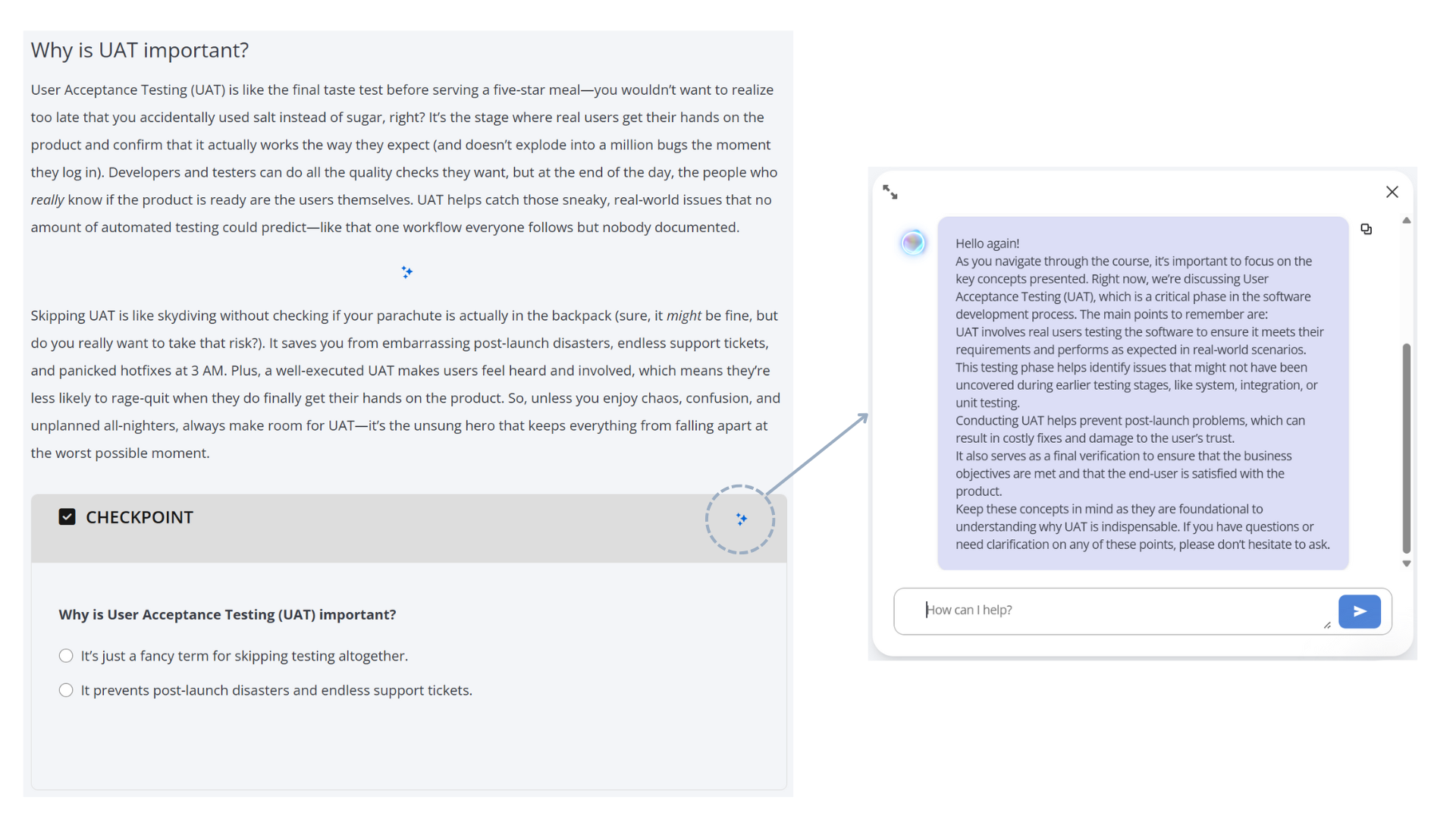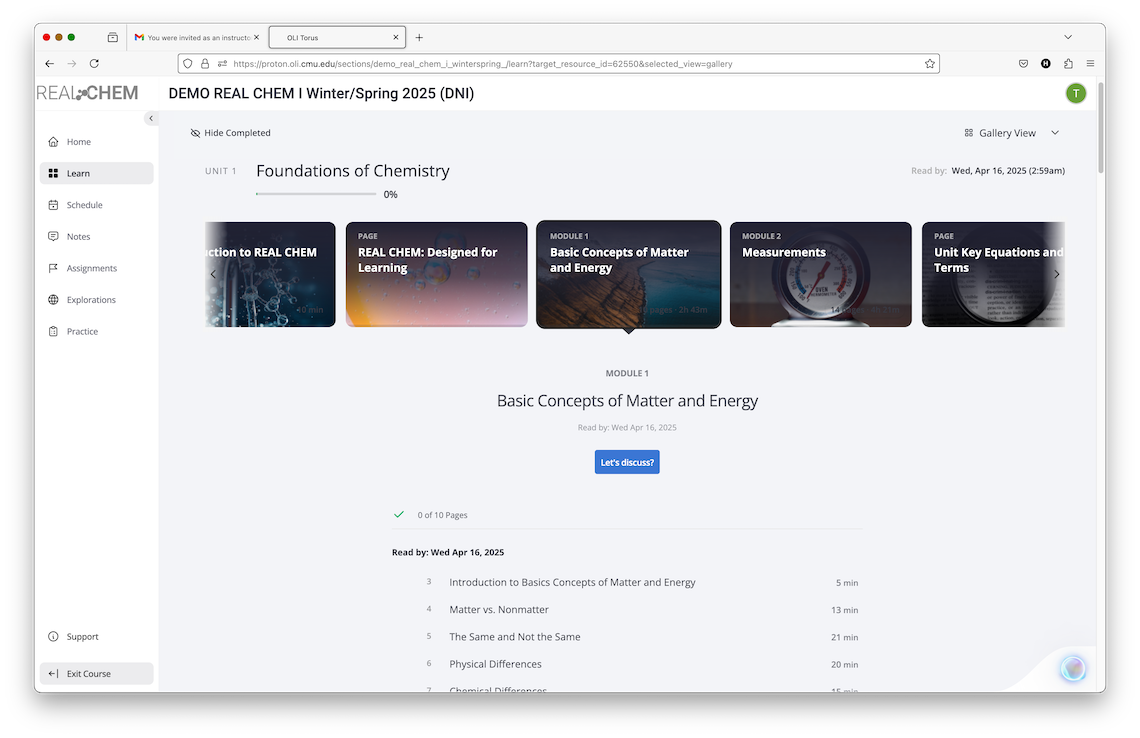Torus version 30, released on April 7th, 2025, introduces a trio of exciting new capabilities designed to deepen engagement, personalize learning, and celebrate student achievement. With the launch of Course Certificates, AI Activation Points, and enhanced Authoring Analytics, this release reflects our ongoing commitment to evidence-based learning and community-driven development. These updates continue to advance Torus’s mission of transforming education through innovative and responsive learning science and design.
Whether you’re building a formal, credit-bearing course or an open-access resource, Version 30 gives you new tools to elevate the learning experience for students and provide meaningful support and recognition along the way.
Key Highlights
Course Certificates
Torus Version 30 introduces a powerful new way to recognize and reward learner achievement: Course Certificates. Course authors can now configure certificates that are awarded to students upon meeting defined completion criteria. These certificates are issued and tracked directly within the Torus platform, offering formal, customizable recognition for progress and performance in both structured courses and open educational environments.
Authors have full control over the requirements students must meet to earn a certificate. Completion criteria can include achieving minimum grades on graded pages, participating in class discussions, and contributing to class notes. Torus supports issuing two types of certificates: a Certificate of Completion and a Certificate with Distinction, allowing authors to differentiate levels of achievement based on grade thresholds or other participation metrics.
In addition, authors can choose whether certificates are awarded automatically once requirements are met or require manual instructor approval before issuance. This added flexibility ensures that instructors retain oversight when needed, while still benefiting from streamlined automation when appropriate.
Certificates are visually generated and delivered to students through the platform, with issuance records managed seamlessly within the course. This feature provides learners with a tangible outcome to celebrate their effort and progress, while helping authors and institutions elevate the value of their courses.
Click on this link for feature documentation on course certificates. Click on this link to watch the feature demo.
AI Activation Points
Torus Version 30 introduces AI Activation Points, a new feature that enables course authors to integrate responsive, in-context support using DOT, Torus’s AI assistant. With this feature, authors can designate specific points within a page, activity, or group element where DOT will appear and interact with students based on a custom-written prompt.
This opens up new opportunities for guiding students through challenging content, prompting reflection, or offering helpful nudges—exactly when they’re most needed. For example, DOT might ask a student to summarize what they’ve just learned, suggest strategies before tackling a concept check, or offer motivational support in a self-paced environment.
Currently, AI Activation Points can be placed on non-graded assessments and regular content pages. This ensures that the AI assistant remains a supportive presence without interfering with high-stakes or graded components of the course. Authors have full control over where and how DOT is activated, as well as what it says—maintaining pedagogical intent while leveraging the dynamic capabilities of AI.
By embedding meaningful interactions into the learning flow, AI Activation Points enhance the personalization and responsiveness of Torus courses, without sacrificing author oversight or instructional quality.
Click on this link to read feature documentation on AI Activation Points. Click on this link to watch the feature demo.
Authoring Analytics Improvements
Version 30 also brings important upgrades to the authoring experience, specifically within the analytics and reporting interface. Course authors now benefit from faster and more efficient data access with improved export. Whether for informal experimentation or high-stakes course delivery, these tools support continuous improvement through better data visibility. The enhanced authoring analytics experience makes Torus an even more effective platform for iterative, data-informed course design.
Bug Fixes and Performance Updates
In addition to new features, Torus Version 30 includes a wide range of bug fixes and performance enhancements across the platform. These behind-the-scenes updates focus on improving stability, accessibility, and responsiveness for users in all roles. As always, a full list of bug fixes and improvements will be available in the official release notes.
Looking Ahead
The additions in Version 30 showcase the continued evolution of Torus into a flexible, intelligent, and learner-centered platform. Each new feature is grounded in feedback from our vibrant community of educators, designers, and learners. We’re proud of what we’ve accomplished together and excited to keep building alongside you.
To explore these updates in more detail, check out the full release notes and watch the Version 30 demo. And as always, stay tuned—Version 31 is already in the works, and it’s shaping up to be another big step forward. You can learn more about version 31 from its design demo available on this link.
Latest News
New dates added: Come see Torus!
Explore the next generation of OLI’s learning platform—Torus. Join our June 26 webinar to see the modern new UI, discussion boards, LMS gradebook passback, AI assistant tools, collaborative notes, and more.
Torus v.31 Strengthens Flexibility and Insight for Teaching and Learning
Adds Score-as-You-Go feedback, redesigned scheduling, LTI integration, and cleaner data exports for smoother teaching workflows.
Design Demo ·
Demo Video ·
Release Notes (coming soon)
Come see Torus!
Explore the next generation of OLI’s learning platform—Torus. Join our June 26 webinar to see the modern new UI, discussion boards, LMS gradebook passback, AI assistant tools, collaborative notes, and more.




